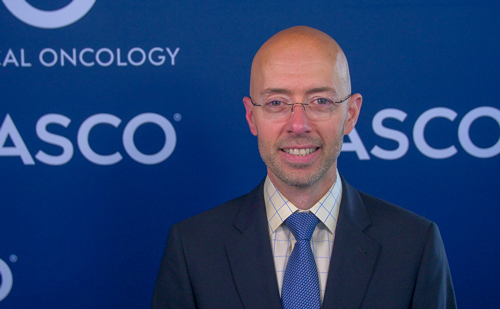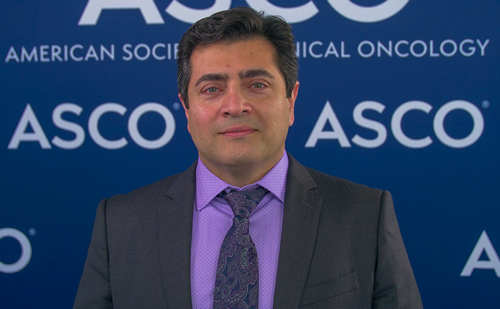With over 400,000 new cases in 2018, kidney cancer is the 9th most commonly occurring cancer in men and the 14th most commonly occurring cancer in women.1 Of these, renal cell carcinomas (RCCs) account for around 95% of all cases.1 Patients with RCC have a 5-year survival rate of approximately 75%, but those with untreated metastatic disease (mRCC) have a 5-year survival rate of only 12%.2 The use of therapies targeting the vascular endothelial growth factor (VEGF) pathway (sunitinib, bevacizumab, pazopanib, axitinib) or the mammalian target of rapamycin (mTOR) pathway (temsirolimus, everolimus) is associated with high response rates and has become the mainstay of treatment of mRCC in the last 10 years.3 However, this approach is not curative; complete responses are rare and relapse inevitably occurs. In the last few years the treatment of mRCC has undergone another significant advance following the advent of immune checkpoint inhibitors, including monoclonal antibodies targeting the programmed cell death-1 (PD-L1) receptor, such as pembrolizumab and avelumab, which have been shown to induce durable responses and increase overall survival (OS).4 However, the majority of patients do not respond to single agent immunotherapy. Even in the pivotal CheckMate 214 study, which combined two checkpoint inhibitors, 58% of participants did not respond to treatment.5
The strengths and weaknesses of targeted agents and immunotherapy suggests that the two approaches may have complementary roles in cancer treatment. Since targeted therapies can cause rapid tumour regressions, with a resulting decrease in tumour-associated immunosuppression, they may allow a window for immunotherapy to exert their more potent cytotoxic effects. The combination of PD-1 checkpoint inhibitors and VEGF targeted therapies is an attractive option in mRCC; however, early studies using sunitinib reported excess toxicity, which halted further development. In a phase I study, axitinib, a more selective VEGF inhibitor approved for second-line treatment of RCC, was shown to be safe in combination with pembrolizumab and showed antitumour activity in patients with previously untreated advanced RCC.6
As a result of these findings, investigators proceeded directly to the phase III KEYNOTE-426 study, the results of which were presented at the ASCO 2019 Genitourinary Cancers Symposium, which was held on 14–16 February 2019 in San Francisco, CA, and published simultaneously in the New England Journal of Medicine.7 In the study, 861 patients with treatment-naive clear cell mRCC were randomly assigned to treatment with either pembrolizumab plus axitinib (n=432) or sunitinib (n=429). Pembrolizumab was administered intravenously at a dose of 200 mg every 3 weeks and axitinib was given orally 5 mg twice daily. Sunitinib 50 mg was given on a 4-week on, 2-week off schedule. Treatment was continued until the disease progressed, patients developed high toxicity, or they discontinued the study.7
At a median follow-up of 12.8 months, combination therapy showed a 47% reduction in the risk of death compared with sunitinib (hazard ratio [HR] 0.53). The 12-month overall survival rate was 89.9% in the combination group and 78.3% in the sunitinib group. These benefits were seen regardless of prognostic risk category or PD-L1 status. Progression-free survival (PFS) was 15.1 months with combined therapy versus 11.1 months with sunitinib. Benefits were also reported with combined therapy in overall response rate (ORR; 59.3% versus 35.7%) and duration of response (not reached versus 15.2 months) compared with sunitinib.7
In terms of safety, the incidence of all grade adverse events (AEs) was similar between the two treatment arms (96.3% with the combination and 97.6% with sunitinib). Grade 3–5 treatment-related AEs were reported in 62.9% of combined therapy group versus 58.1% in those receiving sunitinib. These led to treatment discontinuation in 25.9% versus 10.1%.7
The latest findings from the ongoing JAVELIN 101 study, a phase III study investigating the combination of avelumab and axitinib in patients with previously untreated advanced RCC, were also presented at the ASCO 2018 GU sumposium.8 In a phase Ib study (JAVELIN Renal 100), 58% of participants had an objective response to the combined therapy.9 In the subsequent JAVELIN 101 study, 886 patients were randomised to avelumab plus axitinib (n=442) or sunitinib (n=444). Avelumab was administered intravenously at a dose of 10 mg/kg every 2 weeks and axitinib was given orally 5 mg twice daily. Sunitinib 50 mg was given once daily on a 4-week on, 2-week off schedule. Results at a median follow up of 12 months showed that the combination significantly improved PFS in previously untreated patients with advanced RCC, compared with sunitinib (13.8 months versus 8.4 months; HR 0.69), and the ORR was higher (51% versus 26%).10 Subgroup analysis showed that the ORR and PFS benefits were maintained regardless of PD-L1 status and risk category. Unlike the combination of ipilimumab plus nivolumab, which did not show benefit for patients with favourable risk disease,5 avelumab plus axitinib showed impressive findings in this subgroup, with a 66% response rate.8
The combination of avelumab and axitinib has a manageable and acceptable safety profile. In JAVELIN 101, AEs occurred in 99.5% of patients in the avelumab plus axitinib group and in 99.3% of patients in the sunitinib group; these were grade 3 or higher in 71.2% and 71.5% of the patients in the respective groups.9
Both study populations were similar in terms of risk populations as well percentage of patients with PD-L1 expression ≥1%. However, at the time of reporting, pembrolizumab plus axitinib has shown an OS benefit over sunitinib, while this endpoint has not yet been reached in the JAVELIN 101 study. This may change with longer follow-up and future results are likely to show an OS benefit for this combination, given the durability of responses seen in other trials of immune checkpoint inhibitors. On the basis of these findings, the FDA has given a priority review designation to a supplemental biologics license application for the both combined therapies as first-line treatment for patients with advanced RCC. The decision on both applications is expected later in 2019. Several other combinations are currently being investigated in clinical trials.11
In an editorial published in the New England Journal of Medicine alongside these studies, Bernard Escudier of the Gustave Roussy Cancer Campus, Villejuif, France, considered that the first-line use of both combinations is likely to become the new standard of care in patients with mRCC and be incorporated into future guidelines.12 However, further studies will be needed to determine whether all patients need combination therapy or whether some patient subsets can benefit from single-agent therapy. This is important because combined therapies involving checkpoint inhibitors are associated with significant costs and toxicities.13 As Dr Escudier pointed out, axitinib is potent when used alone and it would have been useful to have a control group with axitinib monotherapy in the current trials to determine whether avelumab and pembrolizumab made a clinically significant contribution to the results.2
As the use of combined approaches increases, it will become increasingly important to educate physicians to identify and manage immune-related AEs. With further combination regimens likely to receive FDA approval, there is a need for data to inform treatment selection. Ongoing studies of biomarkers in mRCC suggest that factors such as angiogenesis, the T-cell effector response, the interferon-γ response, and myeloid inflammatory gene-expression signatures may be useful in predicting response to inhibitors of VEGF, PD-1, and PD-L1.12 Until such data become available, factors such as quality of life, safety, and the proportion of patients who experience complete responses are likely to influence which treatments are used. While longer follow-up data is needed, these are exciting, practice-changing studies in the treatment of RCC.
References :
1. World Cancer Research Fund. Kidney cancer statistics. Available at: www.wcrf.org/dietandcancer/cancer-trends/kidney-cancer-statistics (accessed 21 March 2019).
2. American Cancer Society. Survival Rates for Kidney Cancer by Stage. 2019. Available at: www.cancer.org/cancer/kidney-cancer/detection-diagnosis-staging/survival-rates.html (accessed 21 March 2019).
3. Hutson TE. Targeted therapies for the treatment of metastatic renal cell carcinoma: clinical evidence. Oncologist. 2011;16 Suppl 2:14–22.
4. Alsharedi M, Katz H. Check point inhibitors a new era in renal cell carcinoma treatment. Med Oncol. 2018;35:85.
5. Motzer RJ, Tannir NM, McDermott DF, et al. Nivolumab plus ipilimumab versus sunitinib in advanced renal-cell carcinoma. N Engl J Med. 2018;378:1277–90.
6. Atkins MB, Plimack ER, Puzanov I, et al. Axitinib in combination with pembrolizumab in patients with advanced renal cell cancer: a non-randomised, open-label, dose-finding, and dose-expansion phase 1b trial. Lancet Oncol. 2018;19:405–15.
7. Rini BI, Plimack ER, Stus V, et al. Pembrolizumab plus axitinib versus sunitinib for advanced renal-cell carcinoma. N Engl J Med. 2019;380:1116–27.
8. Choueiri TK, Motzer RJ, Campbell MT, et al. Subgroup analysis from JAVELIN Renal 101: Outcomes for avelumab plus axitinib (A + Ax) versus sunitinib (S) in advanced renal cell carcinoma (aRCC). J Clin Oncol. 2019;37 (suppl 7S):abstr 544.
9. Choueiri TK, Larkin J, Oya M, et al. Preliminary results for avelumab plus axitinib as first-line therapy in patients with advanced clear-cell renal-cell carcinoma (JAVELIN Renal 100): an open-label, dose-finding and dose-expansion, phase 1b trial. Lancet Oncol. 2018;19:451–60.
10. Motzer RJ, Penkov K, Haanen J, et al. Avelumab plus axitinib versus sunitinib for advanced renal-cell carcinoma. N Engl J Med. 2019;380:1103–15.
11. Atkins MB, Tannir NM. Current and emerging therapies for first-line treatment of metastatic clear cell renal cell carcinoma. Cancer Treat Rev. 2018;70:127–37.
12. Escudier B. Combination therapy as first-line treatment in metastatic renal-cell carcinoma. N Engl J Med. 2019;380:1176–8.
13. OncLive. The Rationale Behind Combination Therapy in mRCC. 2018. Available at: www.onclive.com/insights/novel-combination-rcc/the-rationale-behind-combination-therapy-in-mrcc (accessed 19 March 2019).






